It's one of the more frustrating kitchen moments: you open your premium Bosch dishwasher expecting sparkling clean dishes, only to find them still caked with last night's dinner. You bought a Bosch for a reason—they're engineered to last for at least 10 years—so when it's not cleaning, it's easy to jump to the worst conclusion.
Before you start pricing out a new appliance or scheduling a service call in Allen or Plano, take a breath. In my experience, the vast majority of cleaning problems aren't caused by a major mechanical failure. Instead, they usually trace back to a few simple, and thankfully, fixable issues.
Why Your Bosch Dishwasher Fails to Clean in Your Frisco Home
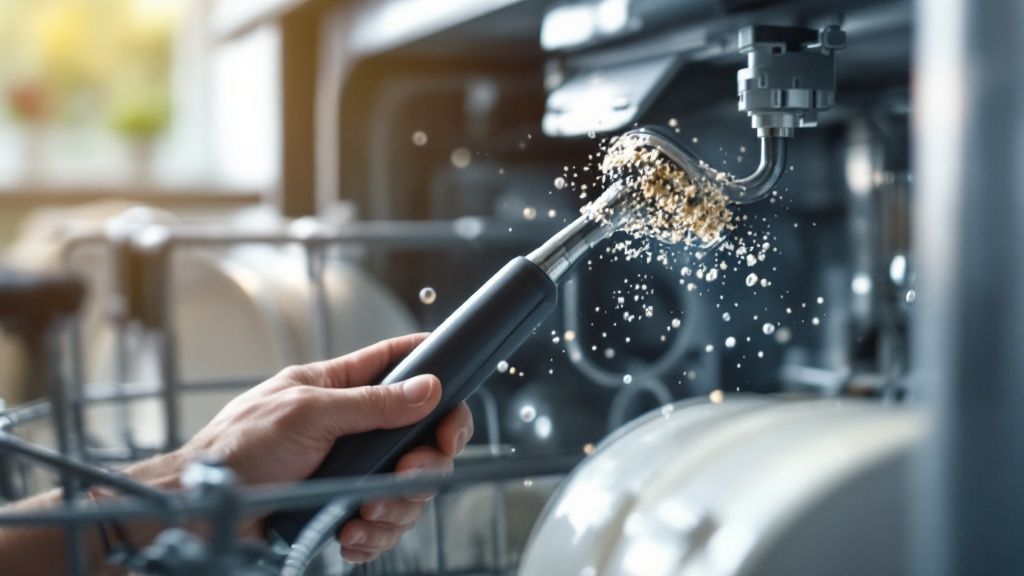
Most of the time, getting your Bosch back to its peak performance is a matter of basic maintenance. We're not talking about a complex repair, but rather a few common culprits that disrupt the cleaning process. Think of it like a car; sometimes it just needs an oil change, not a new engine.
Let’s walk through the usual suspects I see when I'm out on calls in homes across North Dallas, from Frisco to McKinney and Celina.
Common Culprits Behind Poor Cleaning Performance
Your dishwasher is a surprisingly simple system. It needs clean water, effective detergent, and the ability to spray that water everywhere. When something gets in the way of that process, your dishes pay the price.
Here are the issues that account for probably 90% of "not cleaning" complaints:
- A Clogged Filter System: This is the big one. Your dishwasher's filter catches all the food gunk. If it's full, you're just washing your dishes in dirty, greasy water. Yuck.
- Blocked Spray Arms: The little holes (or jets) on the spray arms get clogged with food particles or hard water deposits. A few blocked jets mean entire sections of your racks aren't getting sprayed.
- Improper Loading: It’s tempting to cram everything in, but if dishes are nested together or blocking the spray arms, water can't reach them. It's that simple.
- Detergent and Water Hardness Issues: The famously hard water in North Texas can be tough on dishwashers. Using the wrong detergent or skipping the rinse aid can leave a film on everything.
More often than not, a few minutes of troubleshooting these key areas is all it takes to solve the problem. Let’s get your dishwasher working like it should.
Quick Diagnostic Chart for Bosch Cleaning Issues in McKinney
To get you started, here's a quick way to match what you're seeing on your dishes to the most likely cause. This is the same mental checklist I run through when I first arrive at a customer's home in McKinney.
| Symptom | Most Likely Cause | Recommended First Action |
|---|---|---|
| Gritty film or food specks on all dishes | Clogged Filter System | Clean the main filter and micro-filter at the bottom of the tub. |
| Dishes on only one rack are dirty | Blocked Spray Arm | Remove and clean the spray arm for that specific rack. |
| White, cloudy film on glassware | Hard Water / Rinse Aid Issue | Refill the rinse aid dispenser and check water softener settings. |
| Food is baked onto plates and pans | Improper Loading | Rearrange dishes to ensure they don't block water spray. |
| Detergent pod doesn't fully dissolve | Dispenser Blockage / Low Water Temp | Check that nothing is blocking the dispenser door and run a hot cycle. |
This chart should help you zero in on the problem quickly. By starting with the simplest and most common fixes, you can often avoid the time and expense of a professional repair. In the next sections, we’ll dive into the step-by-step instructions for tackling each of these issues.
Fine-Tuning Your Loading Technique and Detergent Game
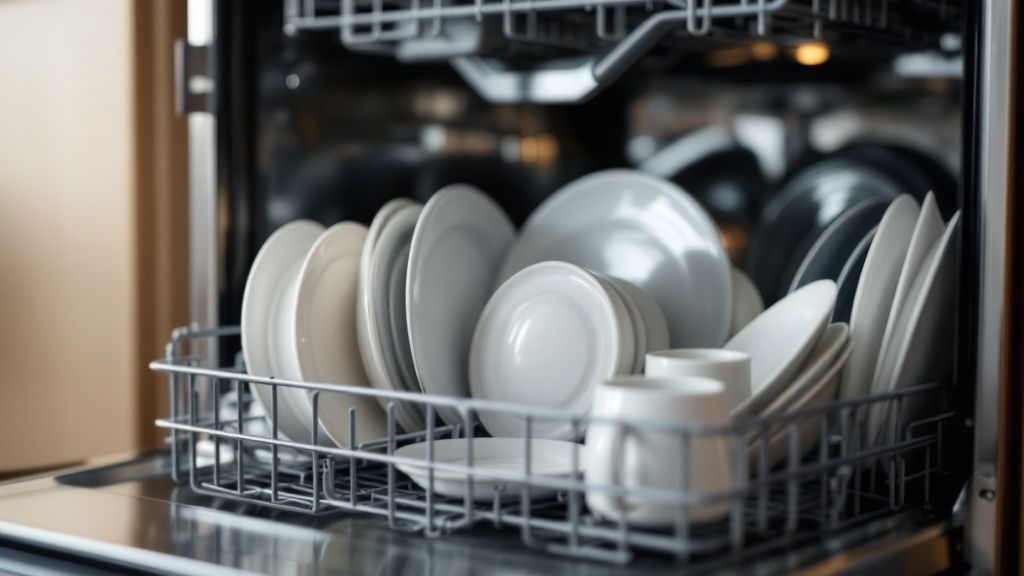
It sounds almost too simple, but how you load your dishwasher is often the number one reason it's not cleaning well. Bosch designs its machines with precision-aimed water jets. When a big casserole dish or a stray spatula blocks those jets, you’ll get whole zones of dirty dishes. Honestly, this is one of the most frequent reasons we get a "Bosch dishwasher not cleaning" call in Plano, and it’s something you can fix right now.
Think of it like a car wash. If you stand too close to the car in front of you, the brushes and sprayers can't reach every spot. It's the same deal inside your dishwasher. The goal isn't just to cram everything in; it's to give the water and soap clear lanes to travel.
Loading With a Plan
Overloading is the biggest enemy of a truly clean dish. We've all done it—squeezing in that one extra plate—but it usually backfires. Items get "nested," like spoons clumping together, creating a barrier that water just can't penetrate.
A little strategy goes a long way. Put your larger, dirtier stuff like pots and pans on the bottom rack, facing down and toward the center spray arm. Your lighter things—glasses, mugs, and small bowls—should go on the top rack, tilted slightly to help water drain out. If you have a Bosch third rack, spread your silverware out. Don't let them touch.
Here's a quick tip we give our clients in Plano and Allen: Before you start the cycle, give the spray arms a gentle spin with your hand. If they hit anything, the water will be blocked. Rearrange until they can rotate freely.
The Right Detergent and Rinse Aid Make All the Difference
Perfect loading is only half the equation. The detergent and rinse aid you choose are just as important, especially with the tough hard water we see all over Frisco and McKinney. Hard water is full of minerals that leave that chalky, white film on your glassware and can eventually build up inside the machine itself.
When you’re up against hard water spots and residue, here’s what you need to know:
- Go for High-Quality Pods: The best detergent pods are multi-taskers. They combine enzymes for food breakdown, a bit of bleach for stains, and rinse aid to fight spots. They're specifically designed to work together and are much more effective against hard water than most powders or gels.
- Don't Skip the Rinse Aid: Seriously. Even if your detergent pod says it has a rinse aid component, you should still use a separate liquid rinse aid. In North Dallas, it’s a must. It works by breaking the surface tension of the water, allowing it to slide off your dishes in sheets instead of forming droplets that leave spots.
- More Isn't Better: Using too much detergent is a common mistake. It won't get your dishes any cleaner and often leaves a sticky, soapy film that actually attracts dirt. A single high-quality pod is almost always the perfect amount.
By pairing a smart loading strategy with the right supplies, you can often solve frustrating cleaning issues on your own and get those sparkling results your Bosch was built to deliver.
Keeping Filters and Spray Arms Working Like New
When your Bosch dishwasher starts leaving food on the plates, the first place I always look is at two often-ignored parts: the filter system and the spray arms. You can think of them as the heart and arteries of the machine. If they get clogged up with food bits, grease, and the mineral scale we see a lot from hard water in areas like Plano and Frisco, the water just can't get through. That’s when cleaning performance takes a nosedive.
Spending a few minutes on regular maintenance for these parts is the single best thing you can do to keep your dishes sparkling. It's a quick job that can save you a ton of frustration and the cost of a service call. If you let them get dirty, it’s like trying to wash your dishes in a muddy puddle—you’re just not going to get good results.
How to Clean Your Bosch Filter System
The filter is your dishwasher's gatekeeper. It catches all the bigger chunks of food before they can get into the pump and cause real damage or, worse, get sprayed right back onto your "clean" dishes. Most Bosch dishwashers have a three-part filter at the bottom of the tub—you'll usually find a coarse filter, a fine filter, and a micro-filter.
You really should get in the habit of cleaning this system at least once a month. If you're running a load every day, you might even want to do it more often. It's easy: just twist the main filter assembly counter-clockwise and pull the whole thing out. Take the pieces apart and give them a good rinse under a warm tap. A soft brush is great for getting stubborn gunk off, but stay away from anything abrasive that could tear the delicate mesh.
This chart breaks down the whole process, from the initial check to running a test cycle to make sure you've nailed it.
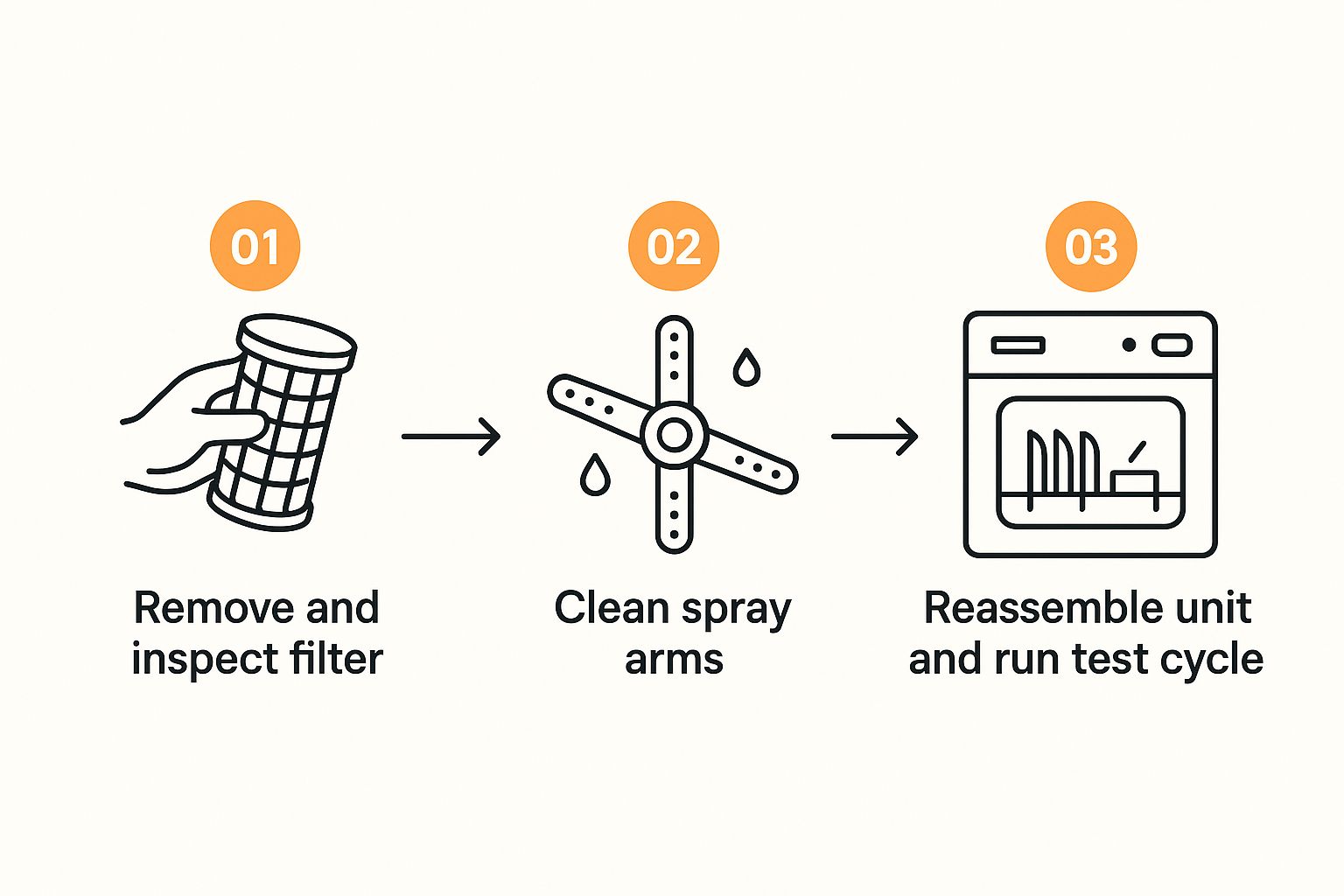
As you can see, it's not just about cleaning. Putting everything back together correctly and running a quick cycle is key to confirming the problem is actually solved.
Checking and Unclogging the Spray Arms
With the filter clean, it's time to check the spray arms. Your Bosch will have two or three of them—one under the bottom rack, another under the top rack, and sometimes a small one at the very ceiling of the dishwasher. These arms are supposed to spin and blast water everywhere, but if even a few of the little holes get blocked, you'll end up with "dead zones" where the dishes don't get touched by water.
Here’s a quick rundown on how to check them:
- Get the Racks Out: First, pull the bottom rack out. You might need to remove the top one too for better access.
- Remove the Arms: The bottom spray arm usually just lifts right off. The middle one might have a locking clip or a ring you need to unscrew first.
- Look for Blockages: Hold each arm up to a light and peek through the tiny spray holes. You're looking for bits of food or that white, crusty mineral buildup.
- Clear the Jets: Grab a toothpick, the end of a paperclip, or some tweezers and gently poke out any debris you see. After that, run water from your sink faucet through the arm to flush out anything you loosened up.
We see this all the time in McKinney homes with hard water: the tiny jets at the very ends of the spray arms get completely choked with mineral scale. When that happens, the water pressure drops off, and you'll notice that the dishes around the edges of the racks are the ones that stay dirty.
Once they're clean, just pop the arms back in place. Give them a quick spin by hand to make sure they turn freely and don't bang into anything. Sticking to these simple steps will make a huge difference in how well your dishwasher cleans. For even more appliance care tips, head over and check out our articles on the ThumbUp.Pro blog.
Checking Your Water Supply and Drainage System
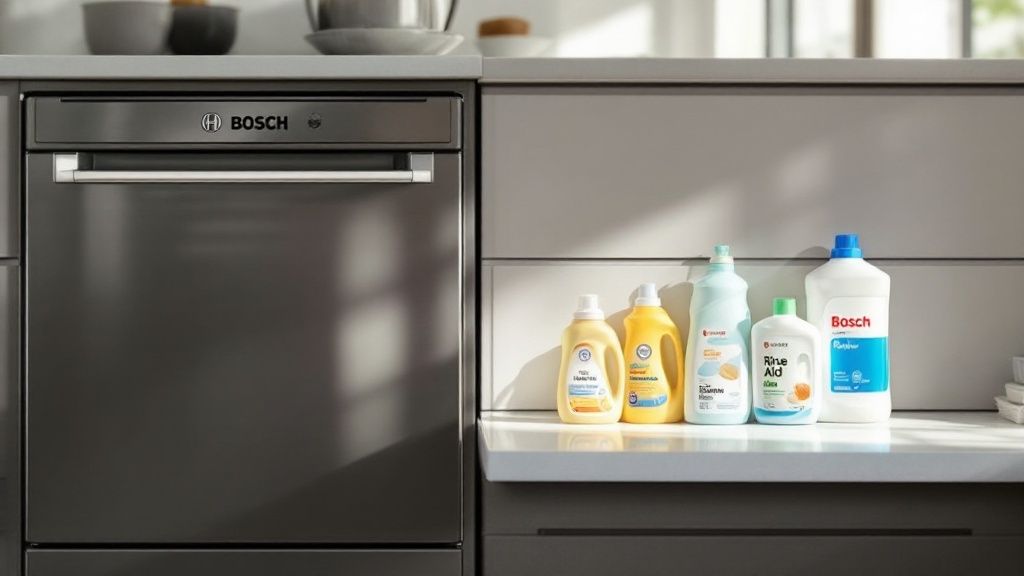
So, you've deep-cleaned the filters and scrubbed the spray arms, but your Bosch is still leaving dishes dirty. What gives? At this point, it’s time to shift our focus from what's inside the dishwasher to how water gets in and out of it.
These issues are less frequent, but they're showstoppers. A dishwasher simply can’t do its job if it's starved for water, if the water isn't hot enough, or if it's recycling grimy water from the bottom of the tub. Let's dig into the plumbing side of things. Many homeowners in Plano and Allen get a little nervous about this part, but you'd be surprised how often it's a simple fix.
Is It Getting Enough Hot Water?
Your Bosch relies on a strong, steady flow of hot water to cut through grease and activate the detergent. If that supply is weak or lukewarm, the cleaning cycle is doomed before it even starts.
An easy first step is to check the temperature. Before you hit "Start" on the dishwasher, go to your kitchen sink and run the hot water tap until it’s steaming. This little trick purges the cold water from the line, ensuring your dishwasher fills with properly heated water from the get-go. For best results, Bosch recommends a supply temperature of at least 120°F.
If the temperature is good, the next thing to inspect is the water inlet valve. This little part is typically tucked away behind the kick plate at the bottom of the machine. It acts as the gatekeeper, letting water into the tub, and it has a tiny filter screen that loves to collect sediment and mineral deposits.
We see this all the time in Frisco homes with hard water. Over the years, that screen gets so clogged that the dishwasher can't fill up properly, leading to terrible washing and rinsing performance.
Making Sure the Dirty Water Can Escape
Getting clean water in is only half the battle; getting dirty water out is just as critical. If the dishwasher can’t drain everything away, that soupy, food-flecked water will just slosh around at the bottom and get sprayed right back onto your "clean" dishes. That’s where that frustrating gritty film comes from.
The drain hose is almost always the culprit here. It’s that flexible, ribbed tube running from the dishwasher to your sink drain or garbage disposal.
Here’s what to look for:
- Pinches and Kinks: Carefully slide your dishwasher out from the counter just a few inches. Follow the drain hose from back to front, making sure it isn't sharply bent or crushed against the wall. This is an incredibly common and easy-to-fix problem.
- The High Loop: Your drain hose needs to be looped up high under the sink, almost touching the bottom of the countertop, before it connects to the drain. This "high loop" is a simple but essential feature that creates an air gap, preventing dirty water from your sink from backwashing into your dishwasher.
- Nasty Blockages: The final step is to check for clogs. You'll need to disconnect the hose from where it meets the sink plumbing or disposal. Have a bucket ready! Shine a flashlight inside and see if there's a buildup of old food and gunk restricting the flow.
Solving these fundamental water supply and drainage problems can feel like a huge win. Once you ensure water has a clear path to enter hot and exit completely, you've handled one of the biggest reasons even a high-end Bosch dishwasher might fail to clean.
When to Call a Bosch Repair Professional in North Dallas
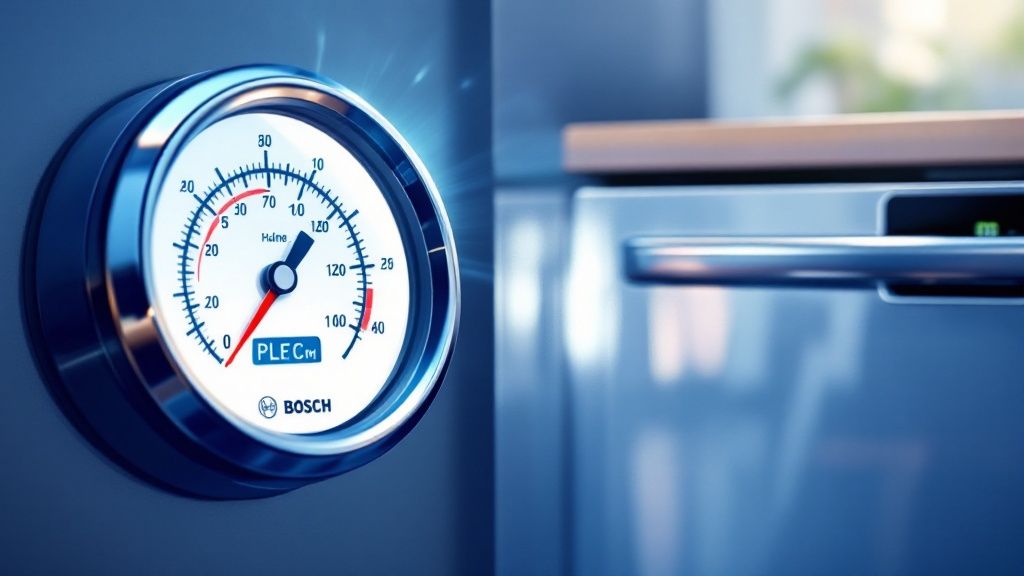
So, you've done everything you can think of. You've cleaned the filter, made sure the spray arms are clear, and even meticulously rearranged the racks to get that perfect water flow. But despite all that work, your Bosch dishwasher is still leaving behind a frustrating film of grime.
When you've exhausted the DIY fixes and the problem persists, it's a solid sign that the issue is lurking deeper inside the machine's complex systems. This is where a little bit of troubleshooting can turn into a big, expensive headache if you're not careful.
Recognizing Red Flags for Serious Issues
Some symptoms are more than just a minor annoyance; they're clear indicators of a failing component that needs an expert's touch. Trying to tackle these yourself without the right training and diagnostic tools isn't just risky—it can lead to water damage, electrical hazards, or even wrecking the appliance for good.
Keep an eye out for these tell-tale warning signs:
- Loud, Unusual Noises: If you hear grinding, humming, or screeching, that's often the sound of a failing circulation pump or wash motor. This is the heart of your dishwasher, and replacing it is definitely not a simple weekend project.
- Water Isn't Getting Hot: Are your dishes coming out greasy and still wet after a full cycle? The heating element has likely burned out. This part is essential for getting the water hot enough to activate the detergent and properly sanitize everything.
- The Unit Won't Start or Quits Mid-Cycle: This could point to a problem with the dishwasher's brain—the control board—or something as simple as a faulty door latch sensor. Guessing wrong on an electronic issue can be a very expensive mistake.
A Bosch dishwasher is a sophisticated piece of German engineering. They are built to last for at least 10 years, but their internal components require precise handling. For any complex electrical or mechanical problem, calling in a specialist is always the safest and most effective move.
The Value of a Local Bosch Specialist in Allen and McKinney
For anyone living in Allen, McKinney, or the surrounding North Dallas area, finding a local repair service that knows Bosch appliances inside and out is crucial. Our technicians have seen it all and understand the specific engineering and common quirks of these machines, which means a faster, more accurate diagnosis.
It’s tempting to think all appliance repairs are the same, but they really aren’t. While you might feel comfortable with some basic upkeep, troubleshooting a different machine requires its own set of skills. For example, you can learn more about the specifics of fridge repair in Allen, TX on our other guides.
Instead of losing your weekend trying to guess which part to order online, a professional can pinpoint the exact problem, give you a clear estimate, and get the repair done safely—often in a single visit. This doesn't just save you a ton of time and stress; it ensures your premium appliance gets fixed right the first time, bringing back that powerful cleaning performance you paid for.
Your Top Bosch Dishwasher Questions, Answered
Even a high-end appliance like a Bosch can leave you scratching your head sometimes. We get calls from homeowners all over North Dallas facing the same little frustrations. Here are the real-world answers to the most common questions we hear about Bosch dishwasher cleaning problems.
Why Are My Glasses Coming Out So Cloudy?
Cloudy glasses are probably the number one complaint we get, especially in places like Plano and Frisco where the water is notoriously hard. That hazy film you're seeing? It's almost always mineral deposits left behind after the water evaporates.
Here’s a quick way to be sure. Just soak one of the cloudy glasses in some white vinegar for five minutes. If the film disappears and the glass is sparkling again, you've got a classic case of hard water.
The best defense is a good offense: keep that rinse aid dispenser full. In North Texas, rinse aid isn't optional. It's what makes the water sheet off your glasses instead of forming little beads that dry into mineral spots.
If the vinegar trick doesn't make a dent, the cloudiness might be permanent etching. This happens when too much detergent is used over time, particularly with softer water, which slowly eats away at the surface of the glass itself.
How Often Should I Really Clean the Filter?
To keep your machine running at its best and avoid that "Bosch dishwasher not cleaning" headache, you need to clean the filter at least once a month. Seriously, think of it like changing the oil in your car—it’s just basic, essential maintenance.
If you're a heavy user—running the dishwasher daily or not scraping plates very well—bumping that up to every two weeks is an even better idea. A clean filter guarantees you're washing with fresh water, not just spraying old food bits back onto your "clean" dishes.
Can I Use Vinegar to Clean My Dishwasher?
Absolutely. White vinegar is a fantastic, safe way to break down mineral scale and get the inside of your Bosch looking new again. But you have to do it the right way.
Here’s how we recommend doing it:
- First, make sure the dishwasher is completely empty. No dishes, no forgotten spoons.
- Pour one cup of plain white vinegar into a dishwasher-safe bowl or measuring cup.
- Place the bowl upright on the top rack.
- Run a normal cycle with the hottest water setting.
This method lets the vinegar circulate safely through the entire system—the tub, spray arms, and even the filter—without harming any of the sensitive seals or gaskets. Whatever you do, never pour vinegar directly into your rinse aid dispenser; it will eat away at the rubber components.
What’s All This Gritty Stuff on My Dishes?
Finding that sandy, gritty film on your dishes is frustrating. It’s almost always one of two things: undissolved detergent or tiny food particles that couldn't drain properly. This points right back to the usual suspects we've been talking about, like a clogged filter or blocked spray arm nozzles.
It can also be a sign that your water isn't getting hot enough. Bosch dishwashers need water that's at least 120°F for the detergent to dissolve and work its magic. Before you panic and assume a major part has failed, go through the basics: clean the filter, check the spray arms for gunk, and run the hot water at your kitchen sink for a minute before starting the dishwasher. This simple checklist solves the problem more than 90% of the time. For a deeper dive, you can explore plenty of other professional appliance repair insights at ThumbUp.Pro.
If you’ve gone through these common fixes and your Bosch dishwasher still isn't getting the job done, it's probably time to bring in a professional. For fast and reliable Bosch appliance repair in Allen, Plano, Frisco, McKinney, or anywhere across North Dallas, you can trust the certified technicians at ThumbUp.Pro. Book your service appointment online at https://thumbup.pro and you'll save $20 on your repair.
Article created using Outrank

